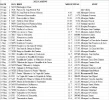I have previously experienced 2 week long Caminos and felt physically great at the end. I am now planning to walk the CF starting after Easter. What I am wondering is after such a long walk is my body likely to need recovery time? I don't intend to push myself to walk longer stages than feel comfortable. The reason I ask is that in July I have a trip to walk the Laugavegur Trail in Iceland, rebooked after Covid delays. I don't want to endanger that experience by wearing myself out walking the CF. I'm now wondering if I should delay my CF plans or maybe walk a shorter route. I'm in my mid 60's and can no longer just take my body for granted!
I would be very grateful for any feedback on the physical effect of walking 500 miles as you get older. (Mind state I'm capable of dealing with.)
Age shouldn't be an issue, I always feel great arriving in Santiago, and my legs dont want to stop. But I think with age comes some sensibility, about looking after yourself, and preparing yourself. Take care with the things that matter; good shoes, hydation, a comfortable pack, blister care etc. And getting fit before you go.
Here's an example of age working in your favour.
There is an event run globally called the Oxfam Trailwalk - its an all terrain - offroad, fairly rugged walk in teams of 4. All team members walk together. (not a relay, you all have to walk together) In most countries you have around 36 hours to complete 100kms. It normally takes us around 24 -27 hours depending on the terrain and weather.
I was 47 when I first completed, and 60 the last time, I've done 5. there are 2 of us as the core, and each time we get 2 others. This is an event where we avoid recruiting people under 40 for our team - the risk of not finishing as a team is high..
This is a generalization but younger people often dont train, or prepare properly and often dont finish. The goal is to finish as a complete team, so if one person in your team doesn't finish, then the team doesn't achieve that. I have actually heard twenty-somethings at the briefing say "Its only a walk, who needs to train for that" (and was glad they weren't in our team). The first aid tents are full of them, even after the first leg (there are usually about 6 stages where you have to check in).
We would usually wear out a pair of shoes just in the training. We look like an unlikely team of middle aged/older women, completely unremarkable - but we always finish with a complete team and in the first 25%.
At the end, the teams with older people usually finish with the team they started with, and in reasonable shape - mostly due to knowing that we arent bullet proof, and that preparation is key.





















